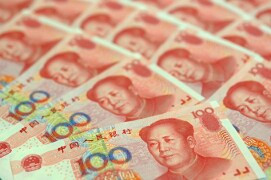
The Chinese yuan continued its slide on Friday as the currency fell beyond its 13-month low. Despite the US government hinting that the central bank is purposely debasing the yuan, the International Monetary Fund (IMF) said it is âfairly valued.â
Speaking in an interview with CNBC, James Daniel, the IMF mission chief for China, explained that the deviation in US and Chinese monetary policies have been contributing the latest decline in the yuan. Daniel noted that the nationâs credit growth remained unsustainably high, even as the financial sectorâs rebalancing of risks had slowed a bit.
With a more flexible exchange rate, trade tensions with the worldâs largest economy, and sluggish economic growth, the IMF official believes this is what you would expect.
The moves haven’t been that big by the standards of other emerging markets. It only takes the currency back to where it was at the beginning of the year and on the average of last year.
Domestically in China, there’s a bit of a slowdown, somewhat of a monetary easing, but the American economy is doing well and there is a tightening bias in America so you’d expect to see this divergent monetary condition reflected in a somewhat weaker exchange rate in China.
US Treasury Secretary Steven Mnuchin told Reuters in Brazil last week that the administration, as well as fellow G7 nations, will be monitoring the yuan in the coming weeks:
Iâm not saying whether itâs a weapon or not a weapon. Thereâs no question that the weakening of the currency creates an unfair advantage for them.
Weâre going to very carefully review whether they have manipulated the currency.
We want them to play by the rules. And that means no forced technology transfer, no forced joint ventures and giving our companies the opportunity to compete fairly. These are issues that are completely consistent across the G7. These issues are shared jointly.
This comes as Goldman Sachs stated in a report that the yuanâs depreciation could serve as an âeffective tool to cushion downward pressures on growth.â
The financial institution explained that a 10% decline in the yuan against a basket of currencies might enable an increase in export growth by as much as six basis points, contributing to the gross domestic product (GDP) by 80 basis points.
As the yuan appreciated in value in recent years, Goldman believes this is an opportunity for Beijing to allow the economy to catch up. However, notes Goldman, the depreciation may face pushback from investors, consumers, and businesses, prompting policymakers to intervene. Whatever the case might be, Goldman forecasts the yuan to rise in the next three months.
Earlier this week, the federal government announced a series of stimulus efforts, reversing a year-long policy of reducing its interventionist policies. Some of these measures include boosting infrastructure spending, increasing bank lending, issuing special bonds, and decreasing reserve requirement ratios.
Since the beginning of June, Chinaâs currency has been declining amid intensifying trade spats with Washington. Beijing will soon enter its third round of tariffs, and there are very little signs that the trade dispute will conclude anytime soon.
On Friday, the yuan recorded its seventh consecutive week of losses, the longest losing streak since November 2015. The currency was unable to take advantage of state-run financial institutions pushing down funding costs in the currency market.
The USD/CNY currency pair rose 0.31% to 6.8137, from an opening of 6.7928. The EUR/CNY also rallied 0.45% to 7.9438, from an opening of 7.9092.
If you have any questions, comments or opinions regarding the Chinese Yuan,
feel free to post them using the commentary form below.